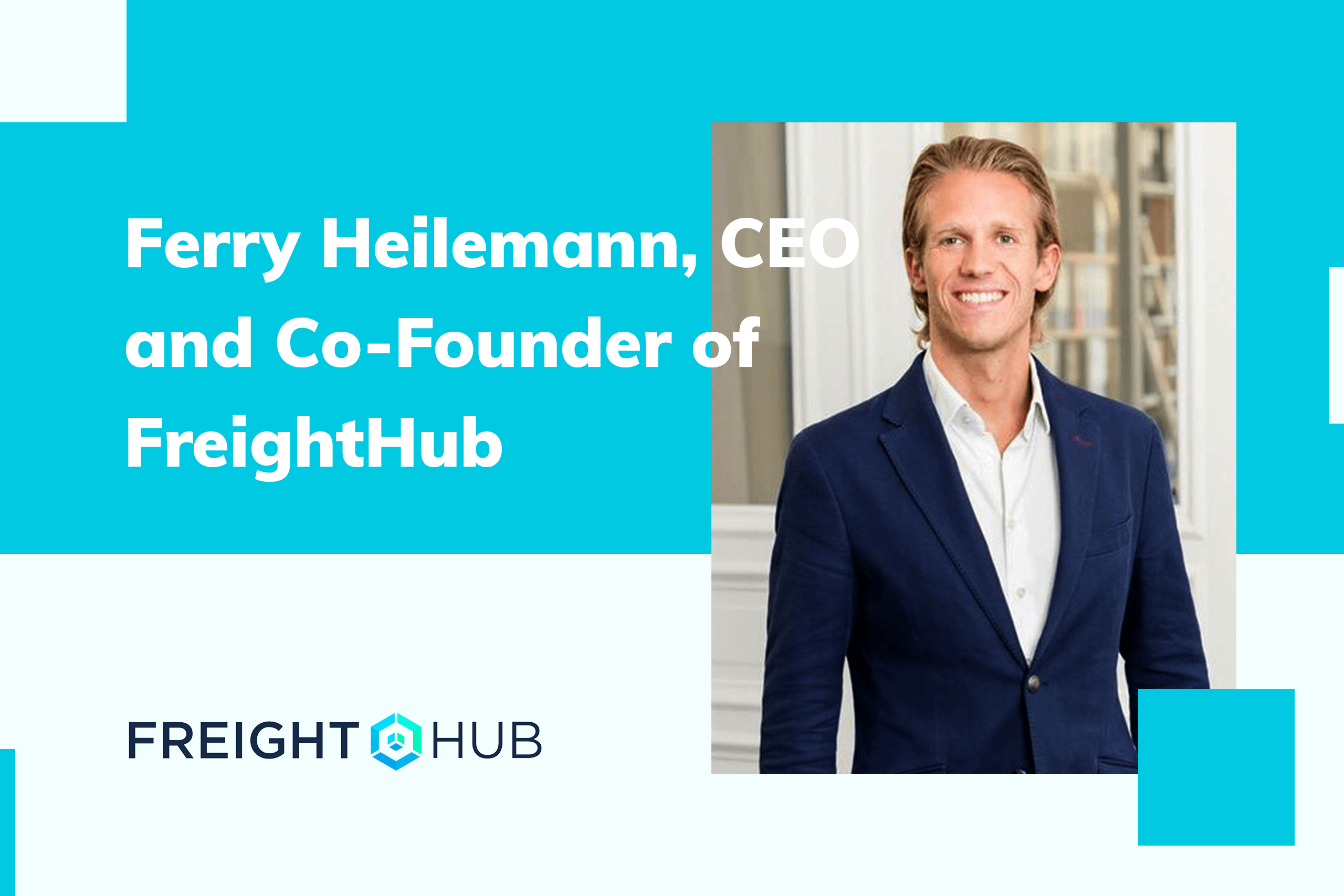The logistics startup scene has never been so robust and forward-looking as it is at the moment. These companies are bringing the fresh innovative spirit to the industry and solving the most complex problems by using the latest technology. A prominent example of such startup is FreightHub, a company based in Berlin and Hamburg and one of the first digital freight forwarders. They provide improved transparency and efficiency by introducing digitization to an industry, dominated by lacking customer service and analog structures.
This time, we had a chance to talk with Ferry Heilemann, FreightHub CEO and Co-Founder. After selling his first tech startup DailyDeal to Google in 2011, Mr. Heilemann and his co-founders have decided to digitize the global freight forwarding industry in 2016. In the following conversation with Transmetrics, he shares the insights about the challenges of logistics startups as well as the opportunities to disrupt the industry.
Ferry, first of all, thank you for taking the time to answer our questions! Let’s start with FreightHub’s story. It began only in 2016, but your team already has more than 120 professionals. How did you manage to grow your team that fast?
Ferry Heilemann: Especially highly motivated and entrepreneurial professionals show great interest in FreightHub and are eager to join because they feel we are changing an industry that has been stagnating for decades when it comes to innovation. For developers, we are offering a challenging problem from a tech perspective and an interesting industry to disrupt. That is why we are an attractive employer for great tech talent around the world. We also take a strategic approach to hiring and start looking early on for key roles that are difficult to recruit. This enables us to really hire the best candidate for the job.
In December last year, FreightHub raised $20 million in funding. First of all, our sincere congratulations! We believe it is well deserved! Can you please describe how difficult the fundraising process was for such a young company as yours? Do you have any advice for the logistics startups on the funding strategies?
Ferry Heilemann: Going through a funding process is always tough. However, we were in a good position – FreightHub offers a great business model, digitizing a largely analog industry, that is attractive to investors because we cater to a large and fragmented market which has not been disrupted yet. We have an experienced management team with a proven track record in building companies. While Erik supported me as CTO in building DailyDeal, which was later sold to Google for about 100m USD, Michael Ardelt, as well as many more team members, are experienced consultants and Michael Wax co-founded Konux, which also just raised a 20m USD Series A round. Additionally, we have managed to put together a great team, combining the best digital DNA with logistics talent from Hamburg and on top have very diverse backgrounds from more than 20 different nationalities.
Our business is showing great traction as we have grown more than 7x in the past year but the biggest challenge is to find investors that take the time to properly understand the business and are aligned with not only our strategic plan but also our vision. We also wanted to find investors that challenge us to elevate our company to the next level.
I advice young entrepreneurs eager to dive into the logistics industry, to build your company around a transparent and pro-active customer-centric service, which many competitors are still lacking.

Picture Credit: FreightHub
Why do you think the investors should be/are interested in logistics industry at the moment?
Ferry Heilemann: The Logistics Industry is a huge, fragmented and super complex market with lots of bureaucracy and inefficiencies. The level of digitalization is very low and therefore you can generate big wins by applying today’s technology to this market. Investors also recognize patterns with other industries that have been disrupted in recent years through companies like UBER, Flixbus, Auto1 etc. Disruption will accelerate with big trends like AI, IoT or blockchain slowly pushing their way into mainstream adaption.
What do you think are the main problems of the traditional freight forwarding companies? How does digitalization help to solve these problems? Which steps would you say the traditional freight forwarding companies need to take in order to stay up to date in today’s digital world?
Ferry Heilemann: In general, we are automating all freight-forwarding processes that can be automated. If a process involves a lot of standardized steps, a machine can normally complete the same task more efficiently and with fewer errors. Despite having a lot of those standardized steps, most of the traditional freight forwarders still do them manually, leading to errors, inefficiencies and ultimately to more costs.
“If a process involves a lot of standardized steps, a machine can normally complete the same task more efficiently and with fewer errors. Despite having a lot of those standardized steps, most of the traditional freight forwarders still do them manually, leading to errors, inefficiencies and ultimately to more costs.”
Efficiency within the booking process. With the ability to optimize transport options based on time and costs but also having the opportunity to book within minutes saves time and therefore money. With a beautifully designed algorithm, it is possible to gather prices from different suppliers and provide spot-rates within seconds. Applying the traditional way, it usually takes up to 3 working days to generate quotes.
Transparency within the current system e.g. a logistics manager and his stakeholders are not able to access all documents at any given moment from every place around the world. Also keeping track of sent documents, even months after a shipment was completed, is really difficult because all communication is based on calls, mail exchange or fax. Documents are either hidden in the depth of an email box or lost in one of the many folders. Having a digital document management system saves the customer a lot of time and effort to gather needed information when a customs inspection is knocking on his door. Also, every member of the logistics team is able to work closer together and decide on time crucial topics even faster.
Reliability. Within the old processes, the shipper had to call or send an email to his freight forwarder which could lead to a long and stressful process to find his containers. Today he has the ability to check the status of his shipment within seconds by himself 24/7 with our Track & Trace System. Of course, he still has two personal contact persons which are also constantly available and help solve exceptions or other problems. But even more than that: Our Operations Team is using technology and automated data to act proactively and fast on occurring exceptions. You are able to know where your goods are in real time and you can see where and why exceptions occur and how they can be avoided in the future.
In general, the logistics industry lacks reliability, transparency and efficiency. Our promise is to change all that.
Recently, one of the hot topics in logistics is blockchain. What do you think is the potential of the blockchain technology for the supply chain industry and for the freight forwarding companies in particular?
Ferry Heilemann: It is important to clearly delimitate between technologies that are foundational vs. those that are innovational. Blockchain is quintessential for further innovations but it does not have the ability to unlock innovation in any market unless everybody is willing to participate. Until everybody shares this foundation you can’t use it to disrupt a complete market.
However Blockchain offers interesting benefits for transactional businesses that shall work in a decentralized fusion – logistics is a very transaction-based industry and something that can definitely need some more democratization. E-bill of lading is a great example, as well as Letters of credit.
Overall enhanced transparency across the supply chain since the true origin and touchpoints of the goods are revealed.
It seems like the blockchain technology might have a strong impact on logistics, but most probably it will take at least several years to mature. Meanwhile, the 2017 Gartner’s Hype Cycle suggests that the AI technologies, the main focus area of Transmetrics, will be among the most disruptive ones in all the industries including logistics over the next 10 years. Which technologies do you think would be the most relevant for transport and logistics in the next 3 years?
Ferry Heilemann: We are considering every technology that helps our customers to deliver things in a better way. Some technologies will result in cost-savings while some other will make things faster, more reliable or safer.
Artificial Intelligence will definitely be one of the most impactful technologies since a lot of processes can be streamlined and automated with machine learning, deep learning and natural language processing. As a first step, we expect fewer errors, increased reliability and an improved Estimated Time of Arrival (ETA) prediction. By automating simple procedures, such as generating a price quoation, which the majority of the industry still conducts in a manual way, we are able to dedicate a bigger margin of our resources towards hard cases. AI also will help us to see and solve problems before they occur and provide data-based optimization for the whole supply chain of our customers.
Older trends like IoT also have a lot of potential and could lead to the location and status tracking of each container.
While it is not realistic to achieve within the next three years, we are also looking forward to lowering the environmental footprint of the logistics industry through innovations like autonomous, zero-emission trucks.

From Left to Right: Erik Muttersbach (Co-Founder & CTO), Ferry Heilemann (Co-Founder & CEO) and Michael Wax (Co-Founder & CCO) Picture Credit: FreightHub
After receiving your recent funding round, we are sure that you have even more ambitious and exciting plans for this year. Can you share with our readers what should they expect from FreightHub in the second half of 2018?
Ferry Heilemann: We will continue to grow our team, open an office in Asia to be closer to our Chinese partners and continue our work in making logistics more reliable, transparent and efficient.
It is impressive to see how our product has improved over the last months and without wanting to spoil anything: We are super excited for some upcoming features that will increase the value we can provide for our customers even more.
Just to conclude our interview, if you would have one chance to start FreightHub all over again, what would you do differently? What would be your business advice for other logistics startup founders?
“My advice for other logistics startups is to concentrate on a more narrow customer segment at the beginning, not trying to serve everyone and then expand over time. Don’t let anyone tell you that you can’t. Keep asking yourself and your customers what needs to be done for your customer to succeed in his job and have an easier life.”
Ferry Heilemann: I would hire faster and do the simple things first, before moving directly to big epics, which take a lot of time and move the focus from the more important things. I also noticed that it takes time to build strong partner relationships and learned that it is important to take care of the ones we established because these are the ones we can rely on. Additionally, I would start by focusing on one trade lane and expand once we learned more about potential pain points and how to get better at what we do.
My advice for other logistics startups is to concentrate on a more narrow customer segment at the beginning, not trying to serve everyone and then expand over time. Don’t let anyone tell you that you can’t. Keep asking yourself and your customers what needs to be done for your customer to succeed in his job and have an easier life.
Read from the original source: Transmetrics





Posted by
Marta Hi! I'm Marta, project manager for Luminary Chiefs. Here to help, post and make sure everything looks great for you.